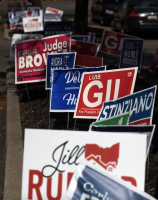 Why does this matter? Some experts argue that the saturation of elections has significant downsides — exhausting voters and hurting the quality of governance by pushing lawmakers toward more campaigning, fund-raising and short-term thinking.
Why does this matter? Some experts argue that the saturation of elections has significant downsides — exhausting voters and hurting the quality of governance by pushing lawmakers toward more campaigning, fund-raising and short-term thinking.
Games Without Borders
08.11.2022 | by German Lopez
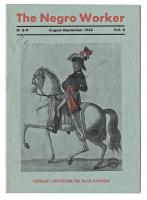 The significance of Mexico for this work is still emerging. Much more remains to be seen about just how deeply embedded the Mexican communists were in the radical networks across the Caribbean where black workers were predominant. Of what I have uncovered, the place of Mexico has two important functions in our historical understanding of the period. First, it was a place of refuge for not only radicals like the forced emigre from Republican Spain, but also for black revolutionaries like Jacques Roumain who spent some time there after being released from prison in Haiti and a short stint in Europe. Second, Mexico was the first people of color Communist nucleus in the western hemisphere, and the sense of anti-imperialism and sensitivity to chauvinism in the CPUSA was critical to strengthening the antiracist struggle across the region.
The significance of Mexico for this work is still emerging. Much more remains to be seen about just how deeply embedded the Mexican communists were in the radical networks across the Caribbean where black workers were predominant. Of what I have uncovered, the place of Mexico has two important functions in our historical understanding of the period. First, it was a place of refuge for not only radicals like the forced emigre from Republican Spain, but also for black revolutionaries like Jacques Roumain who spent some time there after being released from prison in Haiti and a short stint in Europe. Second, Mexico was the first people of color Communist nucleus in the western hemisphere, and the sense of anti-imperialism and sensitivity to chauvinism in the CPUSA was critical to strengthening the antiracist struggle across the region.
Face to face
26.03.2021 | by The Public Archive
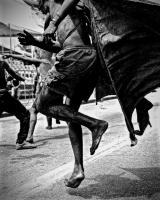 There is a present-day tendency to retreat into the realms of dystopia, of catastrophe and disaster, of failed states and fascism, of environmental collapse and economic apocalypse. This tendency is neither wrong nor mistaken. Yet it is often suffocating, only adding to the pressurized dread of the era, offering no antidote to the plague of cynicism, the chokehold of hopelessness, the drift, or, perhaps, the plunge, into a miasma of pessimism and hopelessness. Of course, there are other tendencies, other possibilities, other ways forward. Here, we briefly mention five recent books, loosely grouped under the banners of anarchism, autonomy, and utopia, that propose better worlds to come – as better must come.
There is a present-day tendency to retreat into the realms of dystopia, of catastrophe and disaster, of failed states and fascism, of environmental collapse and economic apocalypse. This tendency is neither wrong nor mistaken. Yet it is often suffocating, only adding to the pressurized dread of the era, offering no antidote to the plague of cynicism, the chokehold of hopelessness, the drift, or, perhaps, the plunge, into a miasma of pessimism and hopelessness. Of course, there are other tendencies, other possibilities, other ways forward. Here, we briefly mention five recent books, loosely grouped under the banners of anarchism, autonomy, and utopia, that propose better worlds to come – as better must come.
To read
18.03.2021 | by The Public Archive
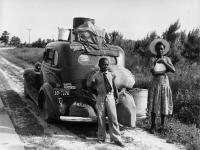 And so it was in these places of refuge that Black Lives Matter arose, a largely Northern- and Western-born protest movement against persistent racial discrimination in many forms. It is organic and leaderless like the Great Migration itself, bearing witness to attacks on African-Americans in the unfinished quest for equality. The natural next step in this journey has turned out to be not simply moving to another state or geographic region but moving fully into the mainstream of American life, to be seen in one’s full humanity, to be able to breathe free wherever one lives in America.
And so it was in these places of refuge that Black Lives Matter arose, a largely Northern- and Western-born protest movement against persistent racial discrimination in many forms. It is organic and leaderless like the Great Migration itself, bearing witness to attacks on African-Americans in the unfinished quest for equality. The natural next step in this journey has turned out to be not simply moving to another state or geographic region but moving fully into the mainstream of American life, to be seen in one’s full humanity, to be able to breathe free wherever one lives in America.
Games Without Borders
17.02.2021 | by Isabel Wilkerson
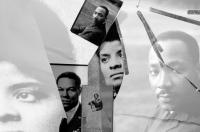 Black historic and political figures have been rendered as vanquishing heroes as well. Noble, brave and transcendent, they have remarkable stories. We tremble in awe before the recounting of Frederick Douglass escaping from slavery and Ida B. Wells narrowly evading the Klan in Memphis, saving her own life — then, through her investigative journalism into the practice of lynching, saving the lives of countless others. Martin Luther King Jr., who survived threats, bombs and jail cells before falling to an assassin’s bullets, has been rendered as the ultimate hero. His depiction is messianic. And though he was a key member of a vast and complex movement, he is often presented as singular. This is the way we tell history in the American public sphere.
Black historic and political figures have been rendered as vanquishing heroes as well. Noble, brave and transcendent, they have remarkable stories. We tremble in awe before the recounting of Frederick Douglass escaping from slavery and Ida B. Wells narrowly evading the Klan in Memphis, saving her own life — then, through her investigative journalism into the practice of lynching, saving the lives of countless others. Martin Luther King Jr., who survived threats, bombs and jail cells before falling to an assassin’s bullets, has been rendered as the ultimate hero. His depiction is messianic. And though he was a key member of a vast and complex movement, he is often presented as singular. This is the way we tell history in the American public sphere.
To read
05.02.2021 | by Imani Perry
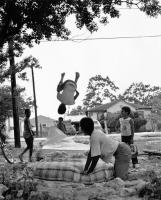 Hudnall records for posterity the architecture of weathered shotgun houses and the vibrant lives within them. He depicts people at ease, celebrating holidays, dressed in their Sunday finery, and kids in the thrall of summertime. “These are the young Floyds coming up,” he says. “They need to be cared for and guided. Rather than holding up a sign and marching for a day or two, then forgetting about it, come here, talk to people, get to know them.”
Hudnall records for posterity the architecture of weathered shotgun houses and the vibrant lives within them. He depicts people at ease, celebrating holidays, dressed in their Sunday finery, and kids in the thrall of summertime. “These are the young Floyds coming up,” he says. “They need to be cared for and guided. Rather than holding up a sign and marching for a day or two, then forgetting about it, come here, talk to people, get to know them.”
Games Without Borders
14.12.2020 | by Earlie Hudnall and Paul Moakley
 For centuries enslaved Africans were taken to Europe and America to serve as workforce. These individuals were forced into submission and considered sub-human. They were brutalized and treated worse than animals by other individuals, and their institutions, which thought of themselves as civilized and modern. These enslaved men and women suffered and despaired, and dreamt of a life before, and of a land more familiar and kind. So, out of the insanity of misery and helplessness, they would eat the soil in the hope of being taken back to that time and land of before.
For centuries enslaved Africans were taken to Europe and America to serve as workforce. These individuals were forced into submission and considered sub-human. They were brutalized and treated worse than animals by other individuals, and their institutions, which thought of themselves as civilized and modern. These enslaved men and women suffered and despaired, and dreamt of a life before, and of a land more familiar and kind. So, out of the insanity of misery and helplessness, they would eat the soil in the hope of being taken back to that time and land of before.
I'll visit
10.11.2016 | by Ana Rita Canhão
 When the Africans discovered that the mato inspired such horror in the Portuguese, they made it their habitual refuge, patiently negotiating from there with the intruders. Queen Njinga, in Angola, played this game to perfection, thus provoking the increasing anger of the Portuguese. Referring to the subterfuges the Portuguese governor opposed to the liberation of her sister, prisoner in Luanda, she wrote on 13 December 1655: “For these and other betrayals I took shelter in the matos, far from my territories” (Cadornega 1972, II: 501). By withdrawing to the forest, the queen was not only obeying a military imperative, but also putting pressure on the Portuguese.
When the Africans discovered that the mato inspired such horror in the Portuguese, they made it their habitual refuge, patiently negotiating from there with the intruders. Queen Njinga, in Angola, played this game to perfection, thus provoking the increasing anger of the Portuguese. Referring to the subterfuges the Portuguese governor opposed to the liberation of her sister, prisoner in Luanda, she wrote on 13 December 1655: “For these and other betrayals I took shelter in the matos, far from my territories” (Cadornega 1972, II: 501). By withdrawing to the forest, the queen was not only obeying a military imperative, but also putting pressure on the Portuguese.
To read
17.05.2011 | by Martín Lienhard
 Why does this matter? Some experts argue that the saturation of elections has significant downsides — exhausting voters and hurting the quality of governance by pushing lawmakers toward more campaigning, fund-raising and short-term thinking.
Why does this matter? Some experts argue that the saturation of elections has significant downsides — exhausting voters and hurting the quality of governance by pushing lawmakers toward more campaigning, fund-raising and short-term thinking.  The significance of Mexico for this work is still emerging. Much more remains to be seen about just how deeply embedded the Mexican communists were in the radical networks across the Caribbean where black workers were predominant. Of what I have uncovered, the place of Mexico has two important functions in our historical understanding of the period. First, it was a place of refuge for not only radicals like the forced emigre from Republican Spain, but also for black revolutionaries like Jacques Roumain who spent some time there after being released from prison in Haiti and a short stint in Europe. Second, Mexico was the first people of color Communist nucleus in the western hemisphere, and the sense of anti-imperialism and sensitivity to chauvinism in the CPUSA was critical to strengthening the antiracist struggle across the region.
The significance of Mexico for this work is still emerging. Much more remains to be seen about just how deeply embedded the Mexican communists were in the radical networks across the Caribbean where black workers were predominant. Of what I have uncovered, the place of Mexico has two important functions in our historical understanding of the period. First, it was a place of refuge for not only radicals like the forced emigre from Republican Spain, but also for black revolutionaries like Jacques Roumain who spent some time there after being released from prison in Haiti and a short stint in Europe. Second, Mexico was the first people of color Communist nucleus in the western hemisphere, and the sense of anti-imperialism and sensitivity to chauvinism in the CPUSA was critical to strengthening the antiracist struggle across the region.  There is a present-day tendency to retreat into the realms of dystopia, of catastrophe and disaster, of failed states and fascism, of environmental collapse and economic apocalypse. This tendency is neither wrong nor mistaken. Yet it is often suffocating, only adding to the pressurized dread of the era, offering no antidote to the plague of cynicism, the chokehold of hopelessness, the drift, or, perhaps, the plunge, into a miasma of pessimism and hopelessness. Of course, there are other tendencies, other possibilities, other ways forward. Here, we briefly mention five recent books, loosely grouped under the banners of anarchism, autonomy, and utopia, that propose better worlds to come – as better must come.
There is a present-day tendency to retreat into the realms of dystopia, of catastrophe and disaster, of failed states and fascism, of environmental collapse and economic apocalypse. This tendency is neither wrong nor mistaken. Yet it is often suffocating, only adding to the pressurized dread of the era, offering no antidote to the plague of cynicism, the chokehold of hopelessness, the drift, or, perhaps, the plunge, into a miasma of pessimism and hopelessness. Of course, there are other tendencies, other possibilities, other ways forward. Here, we briefly mention five recent books, loosely grouped under the banners of anarchism, autonomy, and utopia, that propose better worlds to come – as better must come.  And so it was in these places of refuge that Black Lives Matter arose, a largely Northern- and Western-born protest movement against persistent racial discrimination in many forms. It is organic and leaderless like the Great Migration itself, bearing witness to attacks on African-Americans in the unfinished quest for equality. The natural next step in this journey has turned out to be not simply moving to another state or geographic region but moving fully into the mainstream of American life, to be seen in one’s full humanity, to be able to breathe free wherever one lives in America.
And so it was in these places of refuge that Black Lives Matter arose, a largely Northern- and Western-born protest movement against persistent racial discrimination in many forms. It is organic and leaderless like the Great Migration itself, bearing witness to attacks on African-Americans in the unfinished quest for equality. The natural next step in this journey has turned out to be not simply moving to another state or geographic region but moving fully into the mainstream of American life, to be seen in one’s full humanity, to be able to breathe free wherever one lives in America.  Black historic and political figures have been rendered as vanquishing heroes as well. Noble, brave and transcendent, they have remarkable stories. We tremble in awe before the recounting of Frederick Douglass escaping from slavery and Ida B. Wells narrowly evading the Klan in Memphis, saving her own life — then, through her investigative journalism into the practice of lynching, saving the lives of countless others. Martin Luther King Jr., who survived threats, bombs and jail cells before falling to an assassin’s bullets, has been rendered as the ultimate hero. His depiction is messianic. And though he was a key member of a vast and complex movement, he is often presented as singular. This is the way we tell history in the American public sphere.
Black historic and political figures have been rendered as vanquishing heroes as well. Noble, brave and transcendent, they have remarkable stories. We tremble in awe before the recounting of Frederick Douglass escaping from slavery and Ida B. Wells narrowly evading the Klan in Memphis, saving her own life — then, through her investigative journalism into the practice of lynching, saving the lives of countless others. Martin Luther King Jr., who survived threats, bombs and jail cells before falling to an assassin’s bullets, has been rendered as the ultimate hero. His depiction is messianic. And though he was a key member of a vast and complex movement, he is often presented as singular. This is the way we tell history in the American public sphere.  Hudnall records for posterity the architecture of weathered shotgun houses and the vibrant lives within them. He depicts people at ease, celebrating holidays, dressed in their Sunday finery, and kids in the thrall of summertime. “These are the young Floyds coming up,” he says. “They need to be cared for and guided. Rather than holding up a sign and marching for a day or two, then forgetting about it, come here, talk to people, get to know them.”
Hudnall records for posterity the architecture of weathered shotgun houses and the vibrant lives within them. He depicts people at ease, celebrating holidays, dressed in their Sunday finery, and kids in the thrall of summertime. “These are the young Floyds coming up,” he says. “They need to be cared for and guided. Rather than holding up a sign and marching for a day or two, then forgetting about it, come here, talk to people, get to know them.”  For centuries enslaved Africans were taken to Europe and America to serve as workforce. These individuals were forced into submission and considered sub-human. They were brutalized and treated worse than animals by other individuals, and their institutions, which thought of themselves as civilized and modern. These enslaved men and women suffered and despaired, and dreamt of a life before, and of a land more familiar and kind. So, out of the insanity of misery and helplessness, they would eat the soil in the hope of being taken back to that time and land of before.
For centuries enslaved Africans were taken to Europe and America to serve as workforce. These individuals were forced into submission and considered sub-human. They were brutalized and treated worse than animals by other individuals, and their institutions, which thought of themselves as civilized and modern. These enslaved men and women suffered and despaired, and dreamt of a life before, and of a land more familiar and kind. So, out of the insanity of misery and helplessness, they would eat the soil in the hope of being taken back to that time and land of before.  When the Africans discovered that the mato inspired such horror in the Portuguese, they made it their habitual refuge, patiently negotiating from there with the intruders. Queen Njinga, in Angola, played this game to perfection, thus provoking the increasing anger of the Portuguese. Referring to the subterfuges the Portuguese governor opposed to the liberation of her sister, prisoner in Luanda, she wrote on 13 December 1655: “For these and other betrayals I took shelter in the matos, far from my territories” (Cadornega 1972, II: 501). By withdrawing to the forest, the queen was not only obeying a military imperative, but also putting pressure on the Portuguese.
When the Africans discovered that the mato inspired such horror in the Portuguese, they made it their habitual refuge, patiently negotiating from there with the intruders. Queen Njinga, in Angola, played this game to perfection, thus provoking the increasing anger of the Portuguese. Referring to the subterfuges the Portuguese governor opposed to the liberation of her sister, prisoner in Luanda, she wrote on 13 December 1655: “For these and other betrayals I took shelter in the matos, far from my territories” (Cadornega 1972, II: 501). By withdrawing to the forest, the queen was not only obeying a military imperative, but also putting pressure on the Portuguese. 
